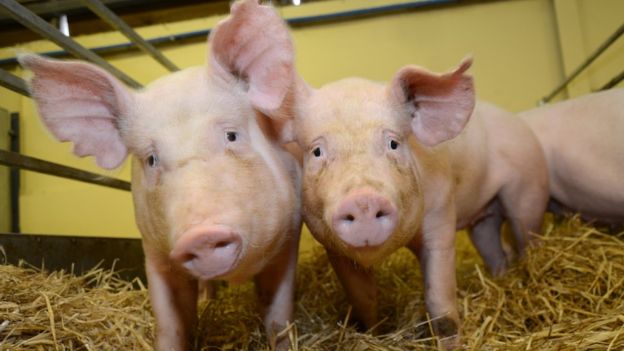A new report from Friends of the Earth and Logos Environmental reveals that the use of gene editing in farm animals poses risks to human health, the environment and animal welfare.

The report comes on the heels of research by the FDA showing that gene-edited hornless cattle have unexpected antibiotic resistant genes, despite researchers’ original claims that they did not contain any genetic errors. This new report sheds light on the unintended consequences of gene editing and considers the implications for U.S. regulations.
Many genetically engineered farm animals are currently in development, funded by private companies or governments and enabled by new gene editing technologies such as CRISPR. Examples include super-muscly cows and pigs, hornless cattle, chickens and pigs made to resist certain diseases, cows with human genes, and other genetic experiments. Production of these gene-edited farm animals is often done with little public awareness or input.
“The scientific evidence shows that gene editing, particularly in animals, is far from ‘precise’. Instead, it can produce unintended changes to genetic material and disrupt genetic processes. Such effects could have far reaching consequences for food safety, so these applications will require a rigorous assessment if they are to be used in agriculture,” said co-author Dr. Janet Cotter of Logos Environmental.
“Corporate profits are a major motivation behind these genetic experiments, and we should be wary of proposals for gene-edited farm animals,” said Dana Perls, report co-author and senior food and technology campaigner with Friends of the Earth. “The types of genetically engineered animals being developed will exacerbate the polluting factory farm model of agriculture and put more money in the hands of climate-destroying Big Ag. We need sustainable and ecological agriculture systems that support the health of animals, preserve and restore biodiversity and protect public health.”
The new report compiles evidence from peer-reviewed scientific studies demonstrating research gaps and unknown and unintended consequences of gene editing in animals. For example, published studies have found enlarged tongues in engineered rabbits and extra vertebrae in pigs, as the Wall Street Journal reported in 2018. Recent cell studies linked CRISPR to DNA damage and cancer concerns.
Key Findings:
- Studies show that, far from being “precise,” gene editing can cause genetic errors, even if only a genetic “tweak” is intended. Genes can be changed at additional locations and gene editing can interfere with gene regulation.
- Common gene editing traits, such as hornless cows and disease resistance, will perpetuate the poor animal management, such as crowding, often found in Concentrated Animal Feeding Operations (CAFOs). This will magnify the current ethical, health and welfare concerns for animals housed in CAFOs.
- Genetic engineering of animals often involves cloning, which leads to birth defects, spontaneous abortions and early postnatal death. Genetic errors can lead to unexpected effects in gene-edited animals, such as enlarged tongues in rabbits and extra vertebrae in pigs. These raise concerns for animal health, welfare and consumer safety.
- Unexpected effects include the production of abnormal proteins in gene-edited animals. Allergens are proteins, so abnormal proteins could create new food allergies and have significant implications for food safety.
- There are significant gaps in research about how genetic errors at the cellular level manifest as unexpected effects and how these unexpected effects may impact the animal’s health, interact with complex environmental factors and affect food safety.
- Although still at the hypothetical stage, gene drive systems could drive a specific trait through a herd or population of farm animals and could accidentally spread to the natural population, potentially affecting biodiversity and even an entire ecosystem.
Recommendations:
- Rather than creating genetically engineered animals to fit into factory farming systems, it is critical to develop sustainable and ecological animal agriculture systems that support animal welfare, preservation and restoration of biodiversity and public health.
- All genetic engineering techniques should fall within the scope of government regulatory oversight of genetic engineering, including gene editing, using the Precautionary Principle to protect human health and the environment.
- Oversight and regulations for GMOs, including gene-edited animals, should include independent assessment for environmental and food safety and long-term impacts before entering the market or environment. Products of all genetic engineering should be traceable and clearly labeled as GMOs.




















God save us because neither Monsanto or the U.S. Government cares.